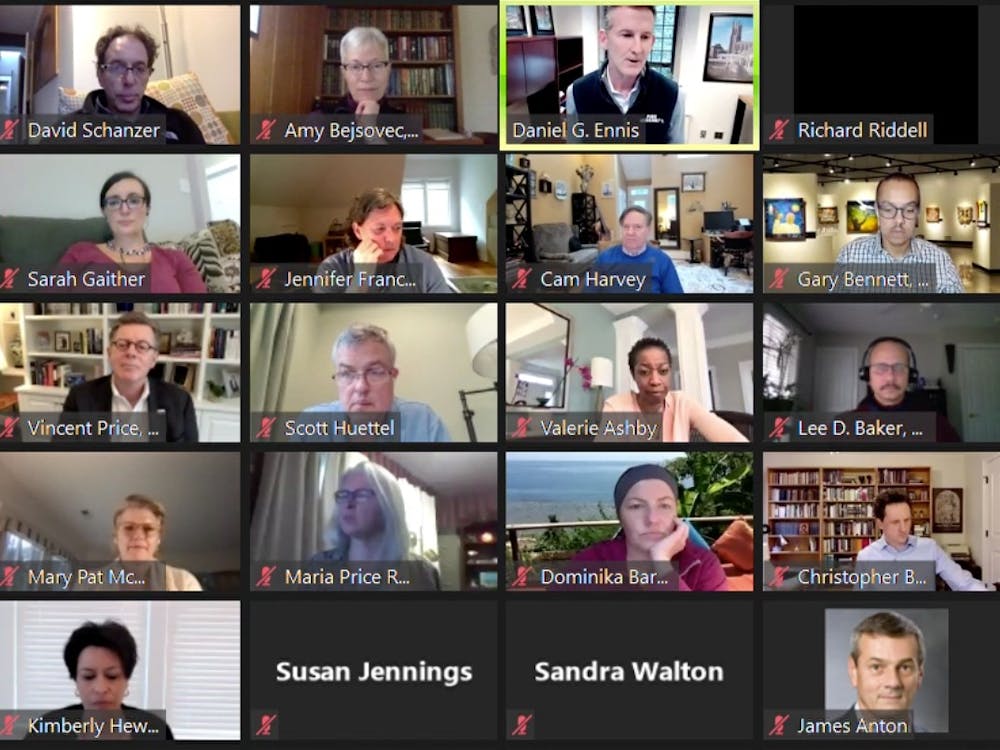Duke's financial situation isn’t as bad as some feared it would be due to the COVID-19 pandemic, but the University is still looking to buy time before loosening spending.
At Thursday's Academic Council meeting, Executive Vice President Daniel Ennis, who took on his role Dec. 1, and other administrators and faculty discussed Duke's financial situation and plans going forward. The group discussed Duke's plans for future cuts but noted that the school's finances are looking up compared to expectations.
"Six months into this year, we're nowhere near as bad as we feared," Ennis said. "It's a big tribute to you all."
Ennis said that the positive trend may not last in the long run. Duke was able to deal with most of its shortfall with "one-time cost savings," Ennis said, but those costs will return in the future.
The second presentation at Thursday's meeting, led by the Team 2030 task force, focused on longer-term cuts. The 2030 strategy team was meant to look for areas where Duke could make financial cuts going forward, after handful of drastic changes made in 2020 that included a hiring freeze and the discontinuation of most new construction projects.
Provost Sally Kornbluth said that along with looking at specific cuts, the group aimed to identify "big bets" that Duke could make to set itself apart from other schools. Thursday's presentation focused on the former category.
"We've navigated the pandemic piece but we still face headwinds in [fiscal year] 2022 and we really need to think about financial stability," Kornbluth said.
Kornbluth noted that Peter Feaver, professor of political science and public policy, chaired a task force that worked on the same issues as the 2030 strategy team. That task force aimed to increase faculty involvement in University plans, after Duke made its 2020 cuts without consulting most faculty, Feaver said.
Feaver also said that his committee came up with 42 ideas, including selling the Duke Hospital complex, central campus or the Duke Forest to raise money—although those ideas didn't gain much traction.
"Whatever Duke does we had to say that we considered a wide range of options," Feaver said.
In his presentation, Ennis predicted that Duke would restore retirement benefits back to pre-COVID levels, but other cuts—including that of hiring and new construction—will stick around.
"Outside of trying to get salary increases in place and the salary contribution restored, we'd still very much like to work in a constrained environment while we get better information," Ennis said.
Overall, Ennis said that Duke will keep in mind a handful of goals—including increasing salaries for some workers and keeping up an equitable competitive benefits program—while looking for ways to save money.
Kornbluth noted that most of Duke's cuts at the moment are coming at the school level—including undergraduate and graduate schools—and that the University is trying to give some leeway for schools to decide where to make cuts. She said that at the moment most savings are coming from cuts to positions when faculty leave or retire and are not replaced.
Unlike many schools, Duke also has to keep its large health system in mind when making choices. Its benefit program extends to health employees, and the health system also accounts for a significant chunk of Duke's spending and revenue.
"The institution made very hard decisions to navigate what was a very concerning crisis," Ennis said. "Institutions that had very significant healthcare as a component of their mission faced an usually challenging operating environment."
Ennis acknowledged that faculty had made serious sacrifices as part of Duke's cuts and he was "appreciative" of those sacrifices, though Duke must continue to be cautious about its finances.
Get The Chronicle straight to your inbox
Signup for our weekly newsletter. Cancel at any time.

